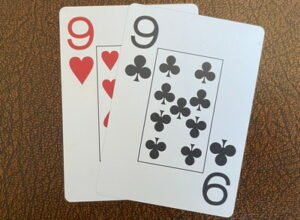 It is very common for many poker players to admit that middle pocket pairs – pocket pairs between 8s and Jacks – can be the trickiest hands to play. There are two common mistakes they make with middle pocket pairs pre flop or when there is an over card to their pair on the board.
It is very common for many poker players to admit that middle pocket pairs – pocket pairs between 8s and Jacks – can be the trickiest hands to play. There are two common mistakes they make with middle pocket pairs pre flop or when there is an over card to their pair on the board.
First, many make the wrong decision before the flop and second, many make the wrong call when there is an over card to their pair.
Making the winning play will normally require players to accurately put their opponents on a hand. However, even if you are struggling to get a read on your opponents, your position at the table plus the amount of opponents in the pot should significantly be influencing your decision making.
When To Discard Middle Pocket Pairs Before The Flop
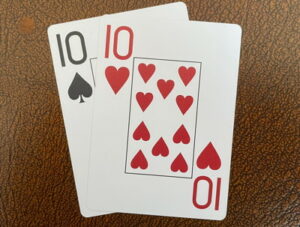 Obviously, middles sized pocket pairs should be folded before the flop when it is obvious that you are facing a higher pocket pair. There are some out there that are worried about making a mistake and believing that their opponent is holding a hand such as KK and later find out that they folded their 99 to an unsuited AQ.
Obviously, middles sized pocket pairs should be folded before the flop when it is obvious that you are facing a higher pocket pair. There are some out there that are worried about making a mistake and believing that their opponent is holding a hand such as KK and later find out that they folded their 99 to an unsuited AQ.
Do not be deterred, that’s the game and all poker players, even the very best ones, will occasionally read a situation wrong and muck a stronger hand.
Accidentally throwing away the best hand once in a while can actually be a sign that you are a sensible and well disciplined player who is ready to act on your read of the other players around you. Also, if you do find yourself outmanoeuvred pre flop and throw away a pair of 10s you will normally find out that you were only slightly wrong and that your opponent were holding a good hand like AK suited in which case you were only a marginal favourite anyway.
Basically, if there was a lot re raising before the flop with three or more opponents in the pot or the re raiser is a tight player known for their high pre flop standards then strongly consider folding.
When To Raise With Middle Pocket Pairs Before The Flop
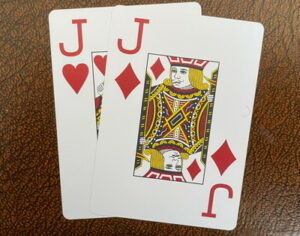 A lot of poker players make the mistake of automatically raising with middle pocket pairs purely because they are middle pocket pairs. Raising with JJ or 1010 pre flop should be used in situations where you are able to trim the field.
A lot of poker players make the mistake of automatically raising with middle pocket pairs purely because they are middle pocket pairs. Raising with JJ or 1010 pre flop should be used in situations where you are able to trim the field.
These pocket pairs do generally play well against one or two opponents but as soon as there are more than three opponents in the pot, middle pocket pairs are less likely to hold up unless they see improvement. This means that, if you are in an early position and no one has called, you can go ahead and raise.
Likewise, if you are in a middle or late position and there is no more than one caller in the pot, you should raise and try to get it heads up or three handed. If you are in a position where a re raise will very likely get it to heads up, go ahead and re raise.
However, if you re raise and more than two opponents call, be extremely careful post flop remembering that you are only raising to thin the field. If your raise fails to achieve this you should play very conservatively after the flop and be prepared to fold, especially when you are in an early position.
When To Call With Middle Pocket Pairs Before The Flop
 When a raise does thin the field or there are more than two opponents in the pot you should simply call. Calling with middle pocket pairs ends up being a good move when you flop a set in a multiway pot. This is because you have deception on your side, and you would normally be a very big favourite. What’s more, with more players in the pot, your odds of success are reduced significantly.
When a raise does thin the field or there are more than two opponents in the pot you should simply call. Calling with middle pocket pairs ends up being a good move when you flop a set in a multiway pot. This is because you have deception on your side, and you would normally be a very big favourite. What’s more, with more players in the pot, your odds of success are reduced significantly.
If you call and the flop contains over cards, you can cheaply fold. A lot of players raise and re raise with hands as weak as 88. Furthermore, their pre flop raising over commits them to the pot meaning that they will frequently bet or call on the flop when it is obvious that they are behind. They will have been hoping for a miracle eight on the turn which almost never eventuates.
Many players would make the point that you should be raising pre flop in a late position while holding middle pocket pairs, even if two players have already entered the pot. However, a raise almost never knocks out the players who have already called. Since the pre flop callers didn’t raise themselves, the automatic presumption is that they hold decent hands, but want to see the flop on the cheap.
Bear in mind also that calling will hopefully keep the pot small. If you raise before the flop, this opponent may call you all the way to the river in order to chase you down because your pre flop raise has unintentionally over committed your opponent to the pot. You don’t want an opponent to chase you all the way to the river with two over cards.
There is another advantage in calling pre flop when there are two players already in the pot which is that you are encouraging your opponents to play their hands. As such, they will give their hand away and you will be able to fold very cheaply. If you raise pre flop, an opponent is highly likely to check to you on the flop and call if you bet. As a result, you won’t get any new information about the strength of a rival’s hand. Better to call before the flop and let your opponents provide you with all the information you need.
Playing Middle Pocket Pairs on The Flop
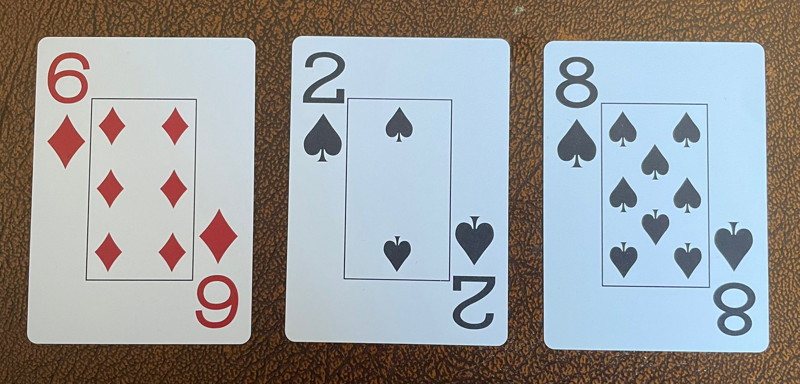
If there isn’t a pre flop raise, playing the flop is a relatively straightforward process. If an over card arrives on the flop and one opponent bets, they are usually telling us that they hit the over card and our pocket pairs have only a 9% chance of winning then fold immediately. Likewise, look towards folding when there is a bet and a call before it’s your turn to act and fold automatically if the flop contains two over cards. In short, wait for optimal opportunities.
However, if you have position on the field and it’s checked to you when there is one over card on the flop, you should bet the flop with the view of checking the turn and river should anyone call. If the flop contains under cards, 2-6-8 for example, bet or raise straight away to define your hand and build the pot while being the favourite. A simple bet or raise on the flop will knock out one or more opponents who may be holding a single over card.
You should not call the flop where you think that you’re in front of the pre flop raiser and there is an opportunity to eliminate other opponents. If you make a call before third opponent behind you does the same, you will not know where you are. If someone cold calls your raise on the flop, then you will have all the information you require. If a number of other opponents call your raise on the flop here, you might be thinking that one of them has paired the over card in which case you should fold at the first available opportunity.
Playing Middle Pocket Pairs on The Turn
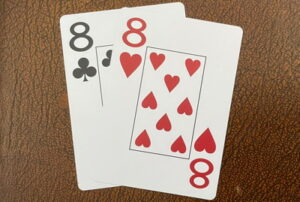 If there are no over cards on the board when you get to the turn, carry on betting. However, if there is one over card on the board and you have made it to heads up and you think that your opponent holds unimproved over cards on the turn, bet on the turn and hope to check the river if they call.
If there are no over cards on the board when you get to the turn, carry on betting. However, if there is one over card on the board and you have made it to heads up and you think that your opponent holds unimproved over cards on the turn, bet on the turn and hope to check the river if they call.
If two or more opponents call your raise on the flop, be ready to check or fold if there is a bet on the turn. Equally, you should check, fold if another over card appears and you receive a bet on the turn. If you are in position and raised on the flop while picking up two or more callers, your opponents are likely to check to you on the turn.
In this case, check behind them and hope to make showdown on the river at no extra cost. Basically, if there is any betting on the turn, you want to be the bettor. If someone else is betting the turn, then fold more often than not. If, for whatever reason, you do choose to bet on the turn and you get raised, fold your cards immediately.
Middle Pocket Pairs On The River
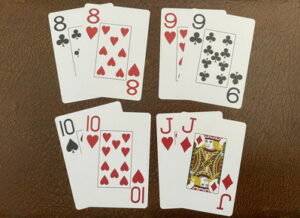 Playing middling pocket pairs on the board is far less complicated. You should bet if the board is comprised entirely of under cards. That being said, if the top card repeats or there is a potential straight, it can be best to consider checking and calling.
Playing middling pocket pairs on the board is far less complicated. You should bet if the board is comprised entirely of under cards. That being said, if the top card repeats or there is a potential straight, it can be best to consider checking and calling.
If someone bets you on the river and there is an over card on the board, they can definitely destroy a pair of 10s with ease. Ideally then, you should check and hope for a free showdown. If an opponent has paired the over card, they are very unlikely to fold on the river if you make a bet. Should there be two over cards on the board by the river, it is hard to bet or call an opponent’s bet.
Lastly, if there was an over card on the flop and you raised before checking on the the turn, calling a bet on the river can be tough. If an opponent bets on the river, they will usually have paired the over card. Sometimes, however, your check on the turn will encourage your opponent to bluff on the river or betting middle pair which you will be able beat. In this case, you should usually fold, but also listen to your instincts if you suspect that your opponent is on a steal.
